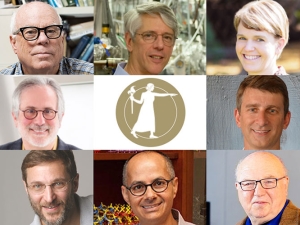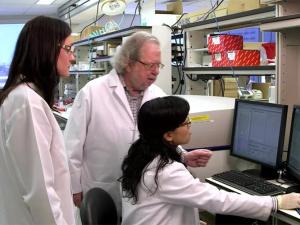Research Bio
Dr. Raulet's laboratory is dedicated to understanding recognition by natural killer cells and T cells, and is developing approaches to mobilize NK cells therapeutically against cancer. He is a world expert in cancer immunology and NK cell biology.
His laboratory has made fundamental contributions to our understanding of both recognition by NK cells and immunoregulation of these important cytotoxic cells, in both cancer and viral infections. His findings have led to new understanding of requirements for pre-activating the cells, their modes of inhibition and processes of desensitization that occur in tumors. These findings, in turn, have enabled the development of new approaches to pre-activate NK cells for maximal NK killing of tumor cells, methods to block inhibition of NK cells, and approaches to reverse desensitization of NK cells, all of which have potential for immunotherapy of cancer. He has demonstrated efficacy of several of these approaches in various models of cancer in mice and pursues translation of these findings for treatments of human cancer.
Immunotherapy of cancer via mobilization of NK cells. Raulet’s lab has investigated NK cell recognition of tumors, including the role of activating ligands such as NKG2D and inhibitory recognition of MHC I molecules. He helped elucidate the role of the NKG2D receptor in tumor recognition by NK cells, by identifying NKG2D ligands, which are targeted by NKG2D, and numerous mechanisms whereby such ligands are induced by stress pathways in tumor cells and infected cells. He has built on these findings by developing therapeutic approaches to mobilize NK cells against cancer. Such mechanisms are sorely needed, for the many tumor types that fail to present antigens that T cells recognize.
NK cell inhibition by KIR/Ly49 and checkpoint receptors. NK cells express inhibitory receptors (Ly49 in mice, KIR in human) that recognize class I MHC molecules and function to inhibit the lysis of cells that express class I molecules normally, and allow the destruction of those that do not. His lab is investigating the molecular mechanisms that endow NK cells with expression of only a few of the 10 or more such receptors that are encoded in the genome. His group has also recently shown that NK cells frequently upregulate inhibitory checkpoint receptors, including PD-1, Lag3, and others.
NK cell tolerance and desensitization to MHC I-deficient cells. Although NK cells are considered components of the innate immune response, Raulet’s group discovered that they have the potential to attack self cells (e.g. self cells that lack MHC I expression). He showed that this potential autoreactivity is limited by mechanisms that render NK cells self-tolerant, in a process that “tunes” NK cell activity by setting the triggering threshold of individual NK cells at optimal levels for discriminating unhealthy cells. The effect is to desensitize NK cells to the point that they fail to kill normal cells. His group showed that this desensitization process can be reversed by cytokines, such as IL-12/IL-18 or IL-2 family cytokines.
NK cell desensitization to normal cells expressing NKG2D ligands: a mechanism that restrains NK cell activity. Raulet’s group recently showed that activating ligands for NK cells can be expressed by normal cells and that engagement of the ligands also induces NK cell desensitization. As a result, blockade of NKG2D in vivo, with a shed, high affinity ligand that is naturally produced in tumor-bearing mice, also leads to greater rejection of certain tumors. These findings suggest that shedding of high affinity NKG2D ligands may lead to augmented NK-dependent rejection of certain tumors in vivo. They also suggest that blockade of the specific NKG2D ligands expressed by endothelial cells may represent a novel approach for immunotherapy of cancer.
Analysis of autochthonous tumor models. Raulet’s group is investigating immunotherapy strategies in spontaneous cancer models, which is providing key insights into mechanisms that may thwart immunotherapy procedures.
Research Expertise and Interest
biology, cancer immunology, natural killer (NK) cells, T-cell development and function, pathogens, viruses, lymphocyte receptors, microorganisms, cancer cells, tumor immunity, immunotherapy of cancer
In the News
Eight Berkeley faculty elected to National Academy of Sciences
Aduro Biotech helps launch new immunotherapy, vaccine effort
UC Berkeley cancer immunologists are teaming up with colleagues working on infectious disease to create a new Immunotherapeutics and Vaccine Research Initiative.


